14. Kinh Pháp Cú – Chương 14: Phẩm Phật Đà – The Buddha – Song ngữ
Dhammapada Sutta (The Path of Truth)
Kinh Pháp Cú
English: Bhikkhu Khantipalo & Sister Susanna, 1993
Vietnamese: Thích Minh Châu, 1996
Illustrated Photos: Venerable-mahasi-sayadaw
Compile: Lotus group
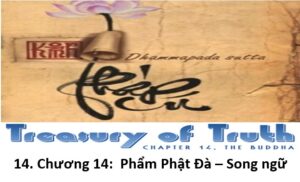
Chapter 14: Buddha Vagga – The Buddha (Verse 179-196)
14. Chương 14: Kinh Pháp Cú – Giảng Lược Phẩm Phật Đà – Song ngữ
Verse 179. The Buddha Cannot Be Tempted
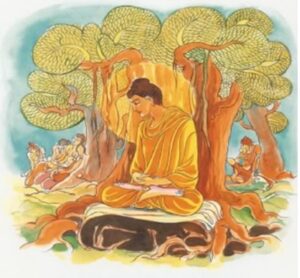
That Buddha traceless of infinite range
Whose victory none may e’er undo,
Whose vanquished follow to no world,
Then by which track will you trace him?
“Vị chiến thắng không bại,
Vị bước đi trên đời,
Không dấu tích chiến thắng,
Phật giới rộng mênh mông,
Ai dùng chân theo dõi
Bậc không để dấu tích?”
Explanation:
By what track can you trace that trackless Buddha of limitless range, whose victory nothing can undo, whom none of the vanquished defilements can ever pursue?
- Chẳng ai hơn nổi người đã thắng phục dục tình. Người đã thắng phục dục tình không còn bị thất bại trở lại, huống Phật trí mênh mông không dấu tích, các người lấy gì mà hòng cám dỗ được?
Verse 180. The Buddha Cannot Be Brought Under Sway
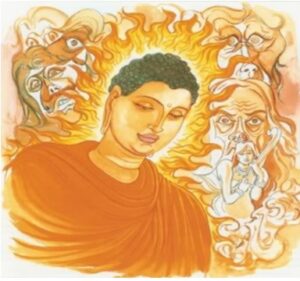
That Buddha traceless of infinite range
In whom’s no entangling craving
And no ensnaring not anywhere lead,
Then by which track will you trace him?
“Ai giải tỏa lưới tham,
Ái phược hết dắt dẫn,
Phật giới rộng mênh mông,
Ai dùng chân theo dõi,
Bậc không để dấu tích?”
Explanation:
By what track can you trace that trackless Buddha of limitless range, in whom exists no longer the entangling and embroiling craving that perpetuates becoming?
- Người dứt hết trói buộc, ái dục còn khó cám dỗ được họ, huống Phật trí mênh mông không dấu tích, các ngươi lấy gì mà hòng cám dỗ được ư?
Verse 181. Gods and Men Adore the Buddha
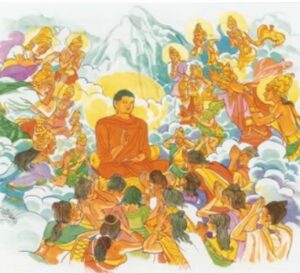
E’er intent on concentration,
Joyful in peace of letting go,
Mindful, wise, the perfect Buddhas,
To even devas they are dear.
“Người trí chuyên thiền định,
Thích an tịnh viễn ly,
Chư thiên đều ái kính,
Bậc chánh giác, chánh niệm.”
Explanation:
Those wise ones who are devoted to meditation and who delight in the calm of renunciation – such mindful ones, Supreme Buddhas, even the gods hold dear.
- Người trí thường ưa tu thiền định, ưa xuất gia và ở chỗ thanh vắng. Người có Chánh niệm và Chánh giác, bao giờ cũng được sự ái kính của Thiên, nhơn.
Verse 182. Four Rare Opportunities
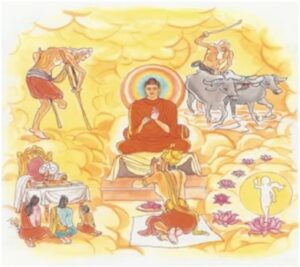
Human birth is hard to gain,
Hard for mortals is their life,
To come to Dhamma True is hard,
Rare the Buddha’s arising.
“Khó thay, được làm người,
Khó thay, được sống còn,
Khó thay, nghe diệu pháp,
Khó thay, Phật ra đời!”
Explanation:
Hard is it to be born a man; hard is the life of mortals. Hard is it to gain the opportunity of hearing the Sublime Truth, and hard to encounter is the arising of the Buddhas.
- Được sinh làm người là khó, được sống còn là khó, được nghe Chánh pháp là khó, được gặp Phật ra đời là khó.
Verse 183. The Instructions of the Buddha

Every evil never doing
And in wholesomeness increasing
And one’s heart well-purifying:
This is the Buddha’s Teaching.
“Không làm mọi điều ác.
Thành tựu các hạnh lành,
Tâm ý giữ trong sạch,
Chính lời chư Phật dạy.”
Explanation:
To avoid all evil, to cultivate good, and to cleanse one’s mind – this is the teaching of the Buddhas.
- Chớ làm các điều ác, gắng làm các việc lành, giữ tâm ý trong sạch. Ấy lời chư Phật dạy.
Verse 184. Patience is a Great Ascetic Virtue
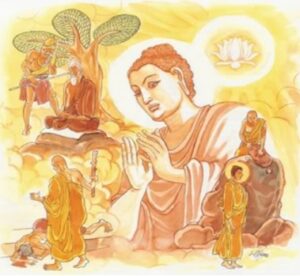
Patience’s the austerity supreme,
Nibbana’s supreme the Buddhas say.
One who irks or others harms
Is not ordained or monk become.
“Chư Phật thường giảng dạy;
Nhẫn, khổ hạnh tối thượng,
Niết bàn, quả tối thượng;
Xuất gia không phá người;
Sa môn không hại người.”
Explanation:
Enduring patience is the highest austerity. “Nibbana is supreme,” say the Buddhas. He is not a true monk who harms another, nor a true renunciate who oppresses others.
- Chư Phật thường dạy Niết bàn là quả vị tối thượng, nhẫn nhục là khổ hạnh tối cao. Xuất gia mà não hại người khác, không gọi là xuất gia Sa-môn.
Verse 185. Noble Guidelines
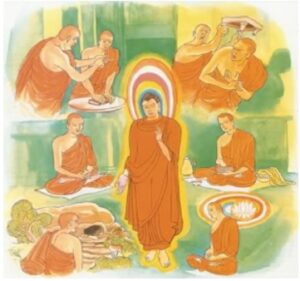
Not reviling, neither harming,
Restrained to limit ‘freedom’s’ way,
Knowing reason in one’s food,
Dwelling far in solitude,
And striving in the mind sublime:
This is the Buddha’s Teaching.
“Không phỉ báng, phá hoại,
Hộ trì giới căn bản,
Ăn uống có tiết độ,
Sàng tọa chỗ nhàn tịnh
Chuyên chú tăng thượng tâm,
Chính lời chư Phật dạy.”
Explanation:
Not despising, not harming, restraint according to the code of monastic discipline, moderation in food, dwelling in solitude, devotion to meditation – this is the teaching of the Buddhas.
- Chớ nên phỉ báng, đừng làm não hại, giữ giới luật tinh nghiêm, uống ăn có chừng mực, riêng ở chỗ tịch tịnh, siêng tu tập thiền định. Ấy, lời chư Phật dạy.
Verse 186. Sensual Pleasures Never Satiated
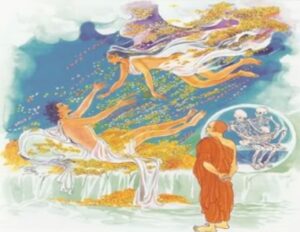
Not by rain of golden coins
Is found desires’ satiety,
Desires are dukkha, of little joy,
Thus, a wise one understands.
“Dầu mưa bằng tiền vàng,
Các dục khó thỏa mãn.
Dục đắng nhiều ngọt ít,
Biết vậy là bậc trí.”
Verse 187. Shun Worldly Pleasures
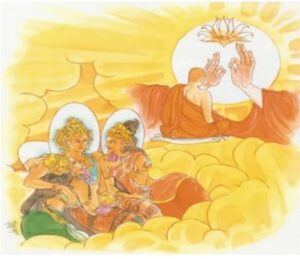
Even with pleasures heavenly
That one finds no delight,
The perfect Buddha’s pupil
Delights in craving’s end.
“Ðệ tử bậc chánh giác,
Không tìm cầu dục lạc,
Dầu là dục chư thiên,
Chỉ ưa thích ái diệt.”
Explanation:
There is no satisfying sensual desires, even with a rain of gold coins. For sensual pleasures give little satisfaction and much pain. Having understood this, the wise man finds no delight even in heavenly pleasures. The disciple of the Supreme Buddha delights in the destruction of craving.
186-187. Giả sử mưa xuống bạc vàng cũng chẳng thỏa mãn được lòng tham dục. Người trí đã biết rõ ái dục vui ít mà khổ nhiều. Thế nên, dù sự dục lạc ở cõi trời, người cũng chớ sanh tâm mong cầu. Đệ tử đấng Giác Ngộ chỉ mong cầu diệt trừ ái dục mà thôi.
Verse 188. Fear Stricken Masses
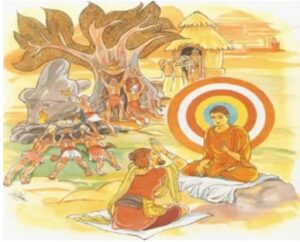
Many a refuge do they seek
On hills, in woods, to sacred trees,
To monasteries and shrines they go.
Folk by fear tormented.
“Loài người sợ hoảng hốt,
Tìm nhiều chỗ quy y,
Hoặc rừng rậm, núi non,
Hoặc vườn cây, đền tháp.”
Verse 189. Those Refuges Do Not Help
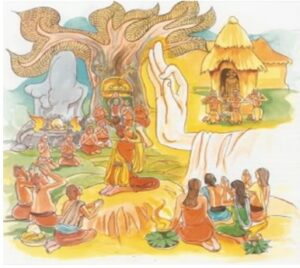
Such refuge isn’t secure,
Such refuge isn’t supreme.
From all dukkha one’s not free
Unto that refuge gone.
“Quy y ấy không ổn,
Không quy y tối thượng.
Quy y các chỗ ấy,
Không thoát mọi khổ đau.”
Verse 190. Seeing Four Noble Truths
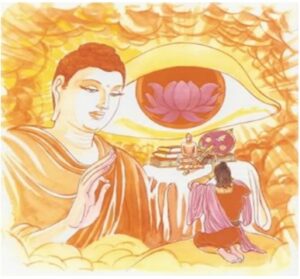
But going for refuge to Buddha,
To Dhamma and the Sangha too,
One sees with perfect wisdom
The tetrad of the Noble Truths:
“Ai quy y Ðức Phật,
Chánh pháp và chư tăng,
Ai dùng chánh tri kiến,
Thấy được bốn Thánh đế.”
Verse 191. The Noble Path
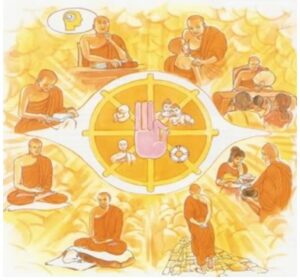
Dukkha, its causal arising,
The overcoming of dukkha,
And the Eight-fold Path that’s Noble
Leading to dukkha’s allaying.
“Thấy khổ và khổ tập,
Thấy sự khổ vượt qua,
Thấy đường Thánh tám ngành,
Ðưa đến khổ não tận.”
Verse 192. The Refuge That Ends All Suffering
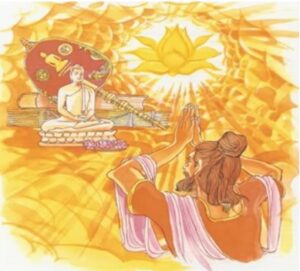
Such refuge is secure,
Such refuge is supreme.
From all dukkha one is free
Unto that refuge gone.
“Thật quy y an ổn,
Thật quy y tối thượng,
Có quy y như vậy,
Mới thoát mọi khổ đau.”
Explanation:
Driven only by fear, do men go for refuge to many places – to hills, woods, groves, trees and shrines. Such, indeed, is no safe refuge; such is not the refuge supreme. Not bu resorting to such a refuge is one released from all suffering. He who has gone for refuge to the Buddha, his Teaching and his Order, penetrates with transcendental wisdom the Four Noble Truths – suffering, the cause of suffering, the cessation of suffering, and the Noble Eightfold Path leading to the cessation of suffering. This indeed is the safe refuge, this is the refuge supreme. Having gone to such a refuge, one is released from all suffering.
188-192. Vì sợ hãi bất an mà đến quy y thần núi, quy y rừng cây, quy y miếu thờ thọ thần (25), nhưng đó chẳng phải là chỗ nương dựa yên ổn, là chỗ quy y tối thượng. Ai quy y như thế khổ não vẫn còn nguyên.
Trái lại, quy y Phật, Pháp, Tăng, phát trí tuệ chơn chánh, hiểu thấu Bốn lẽ mầu: Biết khổ, biết khổ
25 Thọ thần: Thọ chi đề (Rkkhacetya) là “ thọ miếu”, vị thọ thần của Ấn Độ tín ngưỡng, lấy cây làm đối tượng sùng bái, như đối với tháp miếu vậy.
nhân, biết khổ diệt, và biết Tám chi Thánh đạo (26) diệt trừ hết khổ não. Đó là chỗ quy y an ổn, là chỗ quy y tối thượng. Ai quy y được như vậy, giải thoát hết khổ đau.
26 Thánh đạo: Bát chánh đạo: Chánh kiến, Chánh tư duy, Chánh ngữ, Chánh nghiệp, Chánh mạng, Chánh tinh tấn, Chánh niệm, Chánh định.
Verse 193. Rare Indeed Is Buddha’s arising
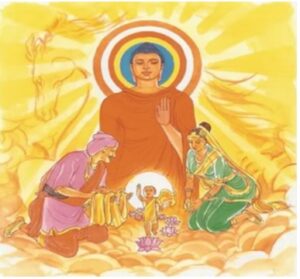
Hard to find the pure and noble
Who isn’t born just anywhere,
Wherever one so wise is born
That family thrives happily.
“Khó gặp bậc thánh nhơn,
Không phải đâu cũng có.
Chỗ nào bậc trí sanh,
Gia đình tất an lạc.”
Explanation:
Hard to find is the thoroughbred man (the Buddha); he is not born everywhere. Where such a man is born, that clan thrives happily.
- Rất khó gặp được bậc Thánh nhơn, vì chẳng phải thường có. Phàm ở đâu có vị Thánh nhơn ra đời thì gia tộc đó được an lành.
Verse 194. Four Factors of Happiness
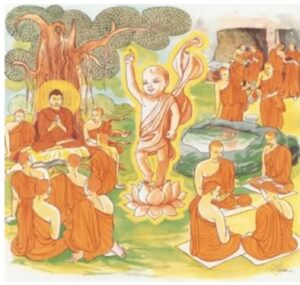
Blessed is the birth of Buddhas,
Blest True Dhamma’s teaching,
Blest the Sangha’s harmony
And blessed is their striving.
“Vui thay, Phật ra đời!
Vui thay, Pháp được giảng!
Vui thay, Tăng hòa hợp!
Hòa hợp tu, vui thay!”
Explanation:
Blessed is the birth of the Buddhas; blessed is the enunciation of the sacred Teaching; blessed is the harmony in the Order, and blessed is the spiritual pursuit of the united truth-seekers.
- Hạnh phúc thay đức Phật ra đời; hạnh phúc thay diễn nói Chánh pháp; hạnh phúc thay Tăng già hòa hợp, hạnh phúc thay dõng tiến đồng tu.
Verse 195. Worship Those Who Deserve Adoration
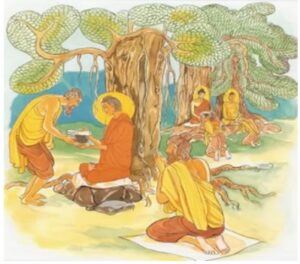
Who venerates the venerable
Buddhas or their disciples,
Have overcome the manifold,
Grief and lamentation left.
“Cúng dường bậc đáng cúng,
Chư Phật hoặc đệ tử,
Các bậc vượt hý luận,
Ðoạn diệt mọi sầu bi.”
Verse 196. Worship Brings Limitless Merit
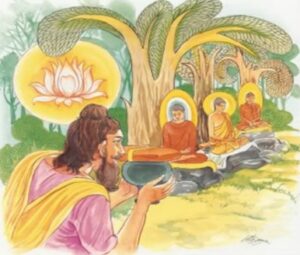
They who are ‘Thus’, venerable,
Cool and free from every fear –
No one is able to calculate
Their merit as ‘just-so-much.
“Cúng dường bậc như vậy,
Tịch tịnh, không sợ hãi,
Các công đức như vậy,
Không ai ước lường được.”
Explanation:
He who reveres those worthy of reverence, the Buddhas and their disciples, who have transcended all obstacles and passed beyond the reach of sorrow and lamentation – he who reveres such peaceful and fearless ones, his merit none can compute by any measure.
195-196. Kẻ nào cúng dường những vị đáng cúng dường, hoặc chư Phật hay đệ tử, những vị thoát ly hư vọng, vượt khỏi hối hận lo âu, công đức của người đã cúng dường các bậc tịch tịnh vô úy ấy, không thể kể lường.

Sources:
Tài liệu tham khảo:
- http://loiphatday.org/kinh-phap-cu-14-pham-phat-da
- http://www.buddhanet.net/dhammapada/d_buddha.htm
- http://acuherbdr-tcm.blogspot.com/2012_01_01_archive.html
- Tam Tu Metta Buddhist Temple & Heritage Garden – 610 Fisher Ave, Morgan Hill, CA 95037
- https://quangduc.com/p22576a29856/kinh-phap-cu-chu-giai-tap-2
